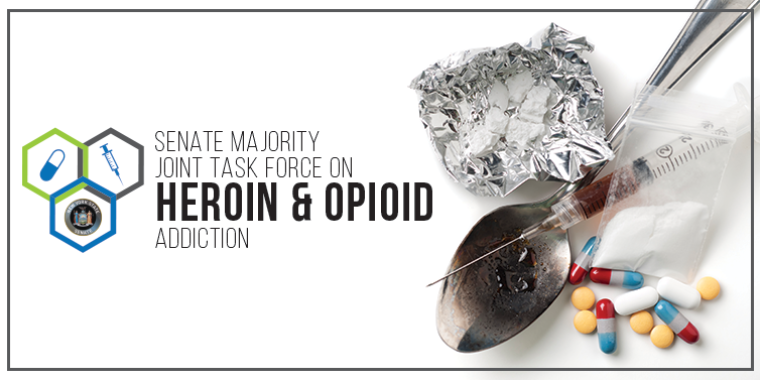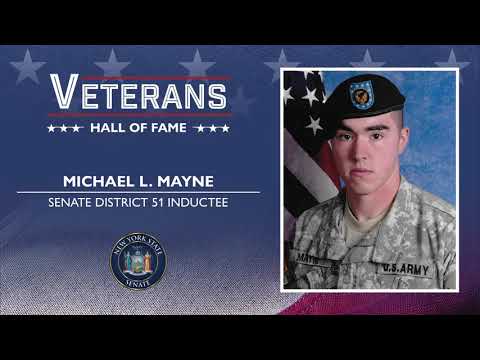
Senate Continues Fight Against Heroin
Jeff Bishop, Communications Director
June 13, 2017

ALBANY, 06/13/17 -- State Senator James L. Seward (R/C/I/Ref – Oneonta) today announced senate passage of a comprehensive package of bills to help decrease heroin deaths and put more drug dealers behind bars for peddling dangerous opioids and synthetic drugs.
“As a member of the Senate’s Joint Task Force on Heroin and Opioid Addiction, I have worked to combat this deadly epidemic which is destroying lives, families, and communities,” said Senator Seward. “A number of new laws have been enacted to help improve education, prevention, treatment, and recovery services; however, we need to do more to stem the flow of these deadly drugs into our communities.”
The package of bills adopted by the senate will build upon existing laws by focusing on enforcement to hold drug dealers more accountable, improve regulation of synthetic opioids, further protect children, and improve the state’s treatment programs to help assist individuals with recovery, among other measures.
“The senate has passed bills in previous years to improve resources for law enforcement, but sadly the state assembly has failed to join us. We are again taking aim at this key portion of the equation – advancing legislation that will crack down on drug dealers who prey on the addiction of others,” Seward added.
Today’s package of bills reinforces action taken earlier this session, including the inclusion of $214 million secured by the Senate Task Force in this year’s budget. This record-high level of funding will help improve prevention, treatment, recovery and education services across the state.
“Heroin and opioid addiction is a public health crisis and no one is immune to the crippling effects of this epidemic. New laws already enacted are making a positive difference, but we continue to identify gaps in service and other needs that must be addressed. These new bills are part of a comprehensive strategy that will enhance our ongoing efforts, help our law enforcement professionals, and save lives,” Seward concluded.
Senator Seward has served on the Joint Senate Task Force on Heroin and Opioid Addiction since its inception in 2014. He has authored legislation to help combat the heroin epidemic, meets regularly with community groups, and has hosted two task force forums in the 51st Senate District to solicit input from local health care professionals, addiction experts, law enforcement officials, and concerned citizens.
Strengthening Enforcement:
Enacting “Laree’s Law” – Holding Drug Dealers Accountable: Bill S2761 establishes the crime of homicide by sale of an opiate controlled substance. Currently, a person who provides an illicit drug that results in the death of a user can typically only be charged with criminal sale of a controlled substance, allowing those involved in the illicit drug trade to escape prosecution for the deaths caused by their actions.
Creating Drug Free Zones Around Drug or Alcohol Treatment Centers: Bill S1127 would criminalize the sale of a controlled substance on the grounds of a drug or alcohol treatment center, or within 1,000 feet of such facilities. Statistics show that drug dealers often prey on individuals with addictions by sitting in the immediate vicinity of a drug or alcohol treatment center or methadone clinic waiting for people to come out so they can sell them drugs.
Establishing New Penalties for Heroin Sales: Bill S880 would create appropriate level penalties as it relates to heroin sales, taking into account the lighter weight of heroin. Heroin weighs less than other drugs and therefore more doses of heroin are needed to trigger various criminal offenses.
Making it Easier to Prosecute Heroin Dealers: Bill S638 would assist in the prosecution of heroin dealers by creating a presumption that the possession of 50 or more individual packages containing heroin and/or having an aggregate value of $300 is possession with intent to sell. Currently, dealers can carry large quantities of the drug before triggering a felony charge of possession.
Cracking Down on Black Market Prescription Drugs: Bill S2814 would establish the offense of fraudulent prescription, dispensing and procurement of non-controlled substance prescription medications and devices, and establish the offense of unlawful possession of non-controlled substance prescription medications and devices. The gaps in existing law and the growth of a black market make it self-evident that change is necessary. This bill will address the problem by increasing or establishing criminal penalties that better fit these crimes.
Prohibiting Dangerous Synthetic Drugs:
Improving the Regulation of Fentanyl: Bill S5884 adds six new derivatives of fentanyl to the controlled substance schedule regulated by the state Department of Health. Fentanyl and fentanyl-combined drugs are a major driver of the many recent overdoses that have occurred across New York State. It is vital for public health and safety to properly regulate this potent drug.
Cracking Down on the Sale of Carfentanil: Bill S623 would make the sale of 2 milligrams or more of Carfentanil a Class A-II felony and the sale of 10 milligrams or more of Carfentanil a Class A-I felony. Carfentanil is synthetic opioid and a schedule II controlled substance, which is 100 times deadlier than fentanyl, and 10,000 times stronger than morphine.
Conforming State Controlled Substances with Federal Schedules: Bill S5357 updates the state controlled substances schedules, promoting consistency with the federal schedules and promoting health and safety. Consistency between the state and federal schedules is important to address the prevalence of abuse and misuse of controlled substances. The bill would also add other known dangerous substances to the state’s schedule of controlled substances, including a synthetic opioid analgesic, often is known as AH-7921, which can cause a deadly psychoactive reaction.
Protecting Children from Drug Abuse:
Toughening Penalties for Sale of a Controlled Substance to Minors: Bill S3845 would help curb rising drug abuse among high school students and other youth by making the sale of a controlled substance by an adult to a minor under the age of 14 a class A-II felony.
Limiting Children’s Opioid Exposure: Bill S5949 helps address the increasing risk of children becoming addicted to opioids and heroin after being prescribed pain-killers for medical procedures or illegally sharing extra prescriptions. The bill requires a health practitioner to receive written consent from a minor’s parent or legal guardian in order to prescribe a medical treatment containing opioids, as well as to discuss the risks of addiction and dangers of overdose associated with the medication. The bill also limits the prescription for a controlled substance containing an opioid to a seven-day duration unless there is a medical emergency that puts the child’s health or safety at risk.
Preventing Addiction and Facilitating Successful Recoveries:
Requiring Patient Counseling Prior to Issuing a Prescription for a Schedule II Opioid: Bill S5670 requires health care practitioners to consult with a patient regarding the quantity of an opioid prescription and the patient’s option to have the prescription written for a lower quantity. The physician must also inform the patient of the risks associated with taking an opiate medication, and the reason for issuing the medication must be documented in the patient’s medical record.
Preventing Predatory and Deceptive Substance Abuse Treatment: Bill S6544 makes it a crime to offer to or accept any kickback from an individual or entity that provides substance abuse services in exchange for patient referral and admission. There has been a rise in individuals who aggressively pursue people in need of substance use disorder treatment services and, for a sometimes-extravagant fee, promise admission to treatment programs. For individuals engaging in this predatory behavior, the most desirable patients are those with robust insurance coverage, and out-of-network benefit packages. Patient brokers refer these clients to programs offering the highest rate of "return" to the patient broker, with little or no regard for the patient's specific needs. This predatory practice capitalizes on, and exploits, families' fears while putting patients at risk of inappropriate treatment.
Expanding Access to Funding for State Substance Abuse Services: Bill S898 authorizes the state Office of Alcoholism and Substance Abuse Services (OASAS) to provide funding to substance use disorder and/or compulsive gambling programs operated by for profit agencies. Current statute states all funds issued by OASAS to provide addiction prevention, treatment and recovery services must be awarded to non-profit providers. For-profit organizations, which provide similar services are unable to apply for state contracts through OASAS and such restrictions limits competition within the RFP process that would ensure state dollars are being used in the most efficient way possible.
Making the State’s Peer Engagement Program Permanent: Bill S6509 would codify the state’s Peer Engagement program. It provides participant-centered peer-to-peer services that emphasize knowledge and wisdom through lived experiences in which peers are encouraged to share first-hand knowledge of substance abuse, addiction, and recovery to support the recovery goals of individuals who use drugs and/or alcohol. Peer Engagement Specialists coordinate with hospital emergency department personnel to help addicts who have undergone an opioid overdose reversal, or after discharge from another substance abuse-related emergency visit to connect with addiction treatment services. This bill also requires additional coordination between peer engagement specialists and police, fire, or other first responder departments in connecting individuals receiving an opioid overdose reversal with treatment services.
In addition to the bills passed today, the senate previously advanced legislation bolstering regulation and penalties for fentanyl derivatives. Bill S933A adds new derivatives of fentanyl to the controlled substance schedule and increases criminal penalties for the sale of an opiate containing a fentanyl derivative.
The bills have been sent to the assembly.
-30-
related legislation
Share this Article or Press Release
Newsroom
Go to NewsroomMichael L. Mayne
November 11, 2020

Statement on Remington Arms
October 26, 2020

State Highway Dedicated in Honor of Fallen Otsego County Marine
October 6, 2020

Statement on Remington Arms
October 1, 2020
